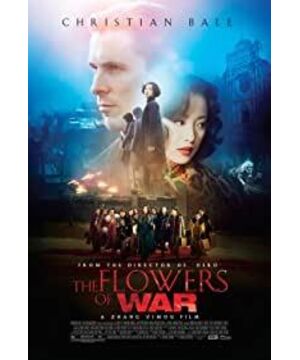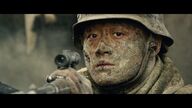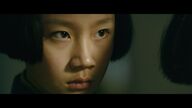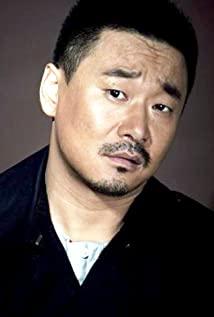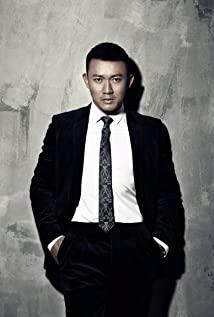When Zhang Yimou chose this theme, controversy inevitably ensues. It can even be said that what the final result of "The Thirteen Hairpins of Jinling" is actually not related to the subject matter of all parties. As long as it comes out, then put forward the pre-judgment position and find something useful to me in the film. Just stuff - it doesn't even matter if you don't find it in the movie, don't we have a movie?
It's a good one, three and a half stars. Just because I say it's good doesn't mean it can't be criticized and dialogued, let alone that the film is impeccable - it's far from the first-class works of the same genre - I just want to criticize the film itself, and the dialogue must be based on the discussion of the film On the topic that goes too far, please detour.
Talk nonsense about movies. Zhang Yimou is very attentive, especially in the polishing of the script. Although the finished film is still a little thin at present, if you take a look at Yan Geling's original work, you will find that many changes are worth pondering. It can even be felt that Zhang Yimou has consciously responded to some possible criticisms in the script.
1. The existence of Instructor Li - the plot of the side-part change pushed
me to see Instructor Li appearing for the first time, I was still sweating. Not for the predictable fate of the characters in the film, but for his positioning. Too much like "Nanjing! Nanjing! "Liu Ye in. Although Liu Ye has reduced a lot of scenes due to schedule reasons, even from the perspective of Lu Chuan's original script, Liu Ye's scenes, including the emotional scenes with Gao Yuanyuan, seem too floating. His function in the film is only to witness the resistance of the Chinese army and the violence of the Japanese army, in other words, to allude to the mainstream ideology - the Japanese are bad and we have fought heroically, but in the real plot. Very little - this also became "Nanjing! Nanjing! "The narrative line is weak, which is one of the reasons why it is regarded as a scene-style film.
When Instructor Li and his brothers used their flesh and blood to resist the Japanese tanks, Zhang Yimou's focus on coarse grain + high-speed slow motion also made me suspect: if this role is really limited to this position, For the whole drama structure, it is too redundant. Fortunately, Instructor Li's follow-up actions were not unconventional. His two actions directly led to two lines: (1) to send the injured child. (2) The Japanese patrol team sacrificed his life to fight. The direct consequence of the former action is to make the two hairpins take risks, and then die one after another, thereby supplementing the danger of the girl going on the date, and to a certain extent, it eases the relationship between the girl and the prostitute, and triggers a small orgasm "Qin Huai Jing"; the latter action It is the main reason for repelling the first wave of zombies in the "Plants vs. Zombies" narrative of the whole film (in fact, it is a typical narrative, which is easier to understand), directly entering the main line, and triggering a small climax of the metaphorical theme of the explosion of flying flowers. . And these two lines make a covert supplement to the "heroic resistance of the Chinese people" required by mainstream ideology.
The prototype of Instructor Li in the original book should be Major Dai, but the changes are very big. Obviously, if Bell wants to make full use of it, the space left for Instructor Li cannot be too much; and the original design, they took refuge in the church, will also cause controversy-as soldiers, you should protect the people, why should the people protect you? With such a change, although the role of Instructor Li is small, the image is also clear enough, and the promotion in the plot is not small.
There are a lot of changes like this, such as Cao Kefan's Shu Juan's father, but instead of simply superimposing, it directly promotes the main line and makes up for some problems, which is a good job. After all, the audience of the original book is relatively narrow, and many problems will not be explained too comprehensively, and these conversions into movies may cause a lot of trouble if they are not careful. Many of Zhang Yimou's changes are aimed at this kind of problem. What's interesting is that he will first put the problem out through the mouth of the character, and then try to solve it. Of course, not every solution is very comprehensive, such as -
2. Choose girls or those women? - possible differences in understanding of different values
No matter from cast selection, theme setting and publicity route, this film is intentionally aimed at overseas markets. So here is a big problem: the handling of the "last wave of zombies", prostitutes for girls, is well understood in terms of the values of ordinary Chinese audiences. But if this is put into the overseas market, it may face a rather politically incorrect question-the same life, why let the prostitutes go to be humiliated and die, but save the girls.
This question was asked directly through Bell's mouth. This is indeed a tough question. In the original book, this point was dealt with carelessly, and Yu Mo and others came forward directly and it was over. If you really do this, it will be the same as "Nanjing! Nanjing! ”, Gao Yuanyuan himself was not as troublesome as being one of the 100 comfort women, or even bigger.
The film has chosen two ways to advance to this point. First, this trouble is advanced in advance, and it is informed early that this is the biggest wave of zombies, causing sufficient dramatic suspense. Then, on the one hand, the prostitutes in the original work were followed on the one hand, and on the other hand, George Chen's sacrifice was set. The former did a great job, adding a girl suicide scene as a foreshadowing, and then Yu Mo mainly defeated everyone else, and moved people with affection. The latter Chen George actually appeared as a substitute for the girls, and his sacrifice made up for the girls. absent. This is actually a bit of a joke. In fact, the problem has not been solved, but it has been avoided through George Chen's righteous deeds. In fact, there is another way, that is, the girl also has a person to make up the difference, so that although the number is not equal, the moral strength is also equal. But doing so may be in conflict with the domestic audience, and the later plots will be more troublesome, so I simply pull George Chen over to make up the number, which is a beginning and an end.
A similar problem is the Christmas invitation itself. For Chinese audiences, what that Christmas invitation means, can be imagined without any explanation. However, if the knowledge of the event is excluded, but the drama is handled, how can it be seen that this invitation is a Hongmen banquet? Although the Japanese army was ferocious before, the image of the Great Colonel offset this impression to a certain extent. Therefore, in the play, the tragic death of the two hairpins is used to imply the inhumanity of the Japanese invaders. But when it comes to the Christmas invitations, there is still a lack of direct explanations - assuming I am an audience member who has no knowledge of the Chinese war of resistance, then I see that the pair may still have fantasies about the Japanese. Should there be more here? For example, Da Zuo or his subordinates turned their faces, and then killed someone or something? Perhaps directly, but it can also point out the dangers of invitations more directly.
3. Bell's ambiguity - who is the protagonist
Bell really won the role of No. 1 without any accident. But let's take a look at the role of this character in the whole film: In addition to the general logistics of various routine affairs, he has two main highlights: First, he stepped forward when dealing with the first wave of zombies, and confronted the Japanese army for the first time as a priest. ; The second is to drive the girls away after the last wave of zombies. But if we take a closer look, we can find that the first wave of zombie incidents ended with the sacrifice of instructor Li, and Bell, who was still unable to fight, witnessed the hero's devotion; the real protagonist of the last wave of zombies was Thirteen Hairpins, or Say it is jade. The plot of Bell driving the students to escape was added to conform to the development of the plot. Although it is not redundant, after the thirteen hairpins got into the car, the biggest suspense was actually over. In other words, Bell completed the function of the second character with the role of the first character.
If you only consider the story, who is the real hero? It is jade ink. First of all, this character has a perfect image (good looks and temperament), rich personality (the boss recognized by prostitutes, skilled in various skills, and has the demeanor of a general from the beginning), full of growth (from the first time I asked Bell, "You Take us away, and I will repay you well." At the end, he persuaded the sisters to dedicate themselves to the girl), and took the lead in completing the greatest act of righteousness. Such a character should be born to be number one. But if she's No. 1, what's Bell's presence?
His sense of existence first comes from the North American market, which is at the commercial level, so I won't go into details. Still read the script, there is no such character in the original work. His role is not a hybrid of the original role, but consciously put into it. His identity is between an insider and an observer, but as an insider, he has never been in too direct danger. Shu Juan, who is narrating as an observer, is obviously more suitable. This is what makes him a little embarrassed. Although according to the classic routine, he has also completed the transformation from a cynical explorer to a hero, and the transformation process has also paved the way for layers, but he still lacks the point that can burst out the strongest sound—— Because he is always detached from the core event.
At this time, when we return to the primary element of existence, we will understand. The game and compromise at the story level are actually for the consideration of two markets: Nanjing does not have Schindler, and even if there are Rabe and Weitling, it is not Father John; Father John does play a role, but the core role is still played by ten Three hairpins are produced, which are explained to the audience in several aspects. But at the same time as this kind of multi-faceted flattery, it is inevitable that there will be a little sense of detachment at the story level - the direct expression is that the climax still owes so much.
The above mentioned only three points, but what I want to say is very clear: on the basis of satisfying various audiences as much as possible, Zhang Yimou and his team worked hard to tell everyone a story. It is placed in the context of the massacre, but carefully eschews the potentially thankless act of directly representing the massacre, instead using it as an extreme setting to play out human nature. Zhang Yimou's ambition is not really big - in fact, it is to tell a good story. Although there are some gaudy displays in the language of the camera lens - such as prostitutes wrapping their breasts and Qin Huai's beauty, they have not fallen into vulgarity, and they do have an expressive function - what a beautiful life will soon wither mercilessly, The cruelty and ugliness of war came out at once. He has his limitations, he also has his limitations, but at least he's not simply selling suffering - a movie can never tell you the absolute truth, but it can ignite your desire to know the truth.
View more about The Flowers of War reviews


